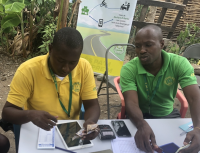Credit Unions and the Need for Expanded Digital Service Offerings
2020-04-14The global COVID-19 pandemic has already fundamentally altered—at least in the short-term—how we manage our lives. This includes how we engage with our extended families, our friends, our co-workers and, not to be forgotten, our finances.
The latter is particularly complicated; just last week news agencies were reporting mounting job losses unlike anything we have ever seen: over 10 million workers have filed for unemployment insurance in the United States, and Ahunna Eziakonwa of the UNDP estimates that unemployment in Africa could soar to 50%. As community-based financial institutions, credit unions may not be able to support how we interact with our families, friends and co-workers, but they are positioned to help individuals and businesses at least weather the impending financial downturn.
In the wake of this crisis, credit unions are rapidly shifting how they do business in order to best support communities at this time. WOCCU and its association member from the United States, Credit Union National Association (CUNA), have each created active news feeds to share what credit unions can and are doing in the wake of the COVID-19 crisis.
In the United States, credit unions are assisting members with loan restructuring, deferred payments, reduced interest fee waivers, interest-only loan payments and loan extensions (CUNA is compiling a list of financial preparedness responses through americascreditunions.org). Given the need for people to stay home to limit person-to-person transmission, most of these services are being offered digitally or through modified teller services, where staff meet members at designated service points to limit person- to-person interaction.
On a Path to Digitization. WOCCU has put digital inclusion at the center of its Challenge 2025, but the crisis has further demonstrated the need for credit unions to extend digital service offerings to their members. In his April message to WOCCU supporters, President and CEO Brian Branch re-emphasized this transformation saying, “credit unions face a time in which their services are critical to their members and yet personal contact can put their employees and their members at risk. This has reinforced the importance of digital service delivery. Remote service delivery via online banking, mobile channels, video tellers has dramatically increased. Many credit unions have closed their lobbies or branches and have focused on service via drive-up, service window tellers and digital channels.”
Many of the digital services being utilized in the United States can be offered through WOCCU’s international credit union networks, but the range of service provision depends largely on the institutional capacity and digital infrastructure. In many of the countries where WOCCU works, digital service offerings are more constrained, especially in countries that rely on person-to-person interaction for a bulk of their customer transactions. Yet despite these challenges, many credit unions are at the forefront of digital financial transformation and WOCCU is a proud partner in helping credit unions reach their digital goals.
Online Lending in Ukraine. Having an efficient system to assess the creditworthiness of borrowers is essential to expanded lending and portfolio management. Since 2016, credit unions in WOCCU’s USAID-funded Ukraine Credit for Agriculture Producers project have been exploring various digital tools to inform credit decisions and effective loan monitoring. One such tool was a Ukrainian-built software for online loan assessment. The pilot activity consisted of four loans disbursed to farmers for a total of two million Ukrainian hryvnia (US $75,000) through central credit unions, including 15 regional branches.
Expanding rural access. WOCCU’s USAID-funded Accessible Finance Activity in Haiti is piloting the use of field officer banking to extend financial services in rural areas with no or limited access to financial institutions. Locally referred to as ‘Kès Pam Pi Pre’M’ (My Credit Union Close to Me), credit union staff equipped with tablets and portable printers visit isolated communities directly using motorbikes to pass through difficult terrain. During their routine village visits, credit union agents use their time to also teach members about the importance of savings to minimize the impact of paying interest rates on loans.
Towards digitization in times of crisis—how we are looking forward. While many of these digital initiatives have been built with long-term sustainability in mind, they are not well-suited to a short-term response requiring limited human contact. But, as mentioned above, credit unions are well-positioned to help in this crisis. Experience during the Ebola epidemic showed that increasing the use of digital services can save lives. Our international programs’ team at WOCCU has developed several ideas for how credit unions can help during this crisis in an increasingly digital world:
- Strengthened communications: WOCCU’s network touches more than 274 million credit union members around the world. As trusted community institutions, credit unions can strengthen their digital outreach efforts to better disseminate public health messaging to their members.
- Support to small businesses: As coronavirus shrinks investment portfolios, financial institutions are likely to restrict personal access to banking facilities and reduce small business financing, especially in lower-income communities where with smaller profit margins. With technical assistance and financing options, credit unions are more likely to respond to their community needs by extending critical access to financial services and credit to small businesses.
- Access to financial services: Many credit unions use digital financial channels to access their members. International development assistance could be invested to support credit unions in expediting their transition to digital tools and expand access to financial services. This could include facilitating mobile payments, digital wallets and on-line loan application tools.
To read more or contribute your ideas in digitization, please visit WOCCU’s Digital Transformation Lab.
This post was written by Dylan Butler, a Project Development Manager for World Council of Credit Unions.


